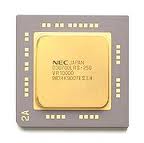shadowless wrote: So what is between the nucleus and the electron shell? is it some other undiscovered matter?
Do not think in terms of "matter" think in terms of mass and energy, Mr. Einstein ties it all together with the whole E=mc^2. Something that may seem "empty" could be full of energy for example, and vice versa.
Also we humans are rather egocentric, so we associate not being able to see/touch/feel something with that space being "empty." You have to think as space being coupled with time, and both forming a fabric. In parts of that fabric, there may be some mass lodged, that mass creates a ripple in the space-time fabric which we call gravity. As I said, think of space-time as a piece of cloth being stretched (the surface of a trampoline if you will), and mass as a heavy ball dropped into that fabric. You will see the ball creates a small indentation on that fabric, or a ripple even... that is gravity.
The theory is that "information" about gravity is carried by infinitesimal particles called gravitrons. So a chunk of space that may seem empty, could very well be full of gravitrons.
A similar proposition can be make about the other major forces in nature: Electromagnetic forces are carried by photons, strong atomic forces use gluons, and weak atomic forces are associated with bossons.
The best way to think about these particles is as carriers of "information." So the reason why the earth for example rotates around the sun is due to the gravity interactions, using a very very simplified "overview" we can think of the gravitational interaction between the earth and the sun as it being due to the gravitons from the sun, meeting up with the gravitons from the earth... and once they finally interact with each other, they go out for dinner, the check each other out, and then they exchange their respective information. With the end result being the expected macroscopical physical behavior based upon a basic set of rules which dictate the universal behavior of gravity. In this case, earth being smaller in both size and mass... ends up being attracted and rotating around the body with larger mass, the sun. As I said this is a very simplified version, but is enough to get a bit of the intuition behind the behavior.
A similar case happens at the sub atomic level, but the interactions there are far weirder and there is where quantum effects come to play... some of them are so bizarre and counter intuitive that IMHO their discovery/understanding is one of the most important achievements of humanity. The reason why the interactions are strange, is that unlike general relativity which involves large distances, and as such can be easily understood by taking the speed of light as an universal limit to the speed of information transfer for those gravity particles. At the sub atomic level the distances are so small, that speed of light is no longer a good approximation (remember that physics at a very basic level is about creating models about physical behavior based on approximations, which the human brain can deal with). So very funny things happen at the subatomic level in the space-time fabric.
So even though we could think of the space between an electron and the nucleus as being "empty." An external electron shot into that space for example, will not "see" an empty area at all. It will se a force field of sorts (to use sci-fi jargon). So what looks "empty" to you, it looks like an actual wall to an atomic particle. But it is a probabilistic field, and that is where a lot of the "weirdness" comes to play. So indeed, given the correct conditions an electron or other particle could theoretically pass through that supposedly empty space. But since the probability is so small, and it has to be so for every single particle in your fist (for example)... the probability of your fist passing through a wall untouched is for all intents and purposes pretty much zero.
Once all the subatomic and fundamental particles are fully accounted for, our understanding of physics will be far more complete. That is why experiments like the LHC at CERN are so fundamentally important. Regardless of all the idiocy the mass media comes up about black holes and other idiotic concerns...
In resume, do not think as space being "empty," think of it being a four dimensional space-time fabric where fundamental particles carry and exchange information about the fundamental forces of nature.
Then for fun, there are things like string theory which adds more dimensions, or stuff like quantum entanglement which seems to allow for exchanges of state information at speeds which are orders of magnitude faster than light, for example.
In a sense, we are (as being the only sentient and self aware beings in our tiny corner of the galaxy) the way the universe came up with to understand itself. If people were aware of all the cool stuff that surrounds us, how much we still have to figure out, and how we are as integral part of this universe as any major celestial body is... I would like to think that as a species we would spend far less time and effort gracing at our navels destroying each other, and more time enjoying, exploring and understanding our infinite playground: the cosmos.
Oh well...
"Was it a dream where you see yourself standing in sort of sun-god robes on a
pyramid with thousand naked women screaming and throwing little pickles at you?"
pyramid with thousand naked women screaming and throwing little pickles at you?"




 I guess FIFA decided our players weren't make a good enough job f-cking up that they needed help.
I guess FIFA decided our players weren't make a good enough job f-cking up that they needed help.



 Okayyyyyy...... let's just say we have very differing tastes then.
Okayyyyyy...... let's just say we have very differing tastes then.


